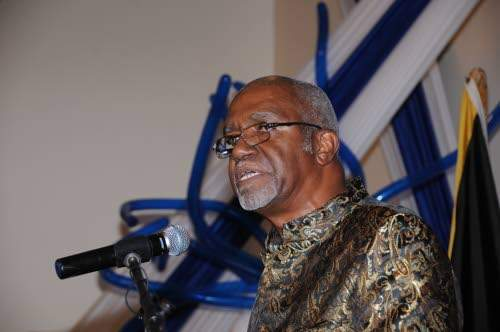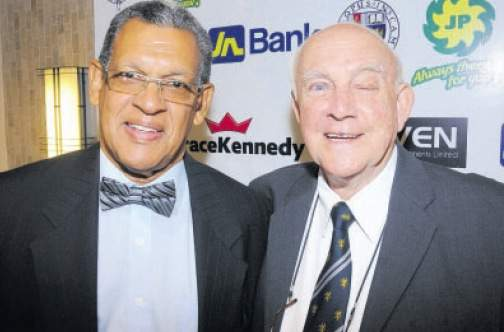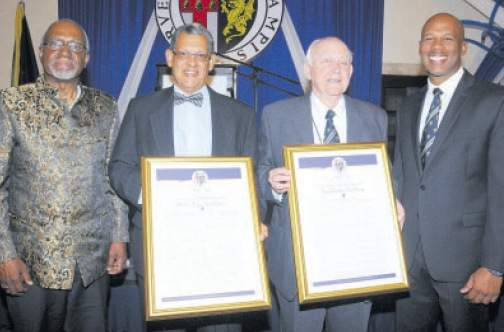Justice Robinson urges society to be guided by JC's motto
- Jun 18, 2017
- 4 min read
MAY the college flourish, work is burning in the fields.
The simple phrase, which is the English translation to Jamaica College (JC) school motto, Floreat Collegium, Fervet Opus in Campis, was used as the catapult on Wednesday night to charge over 300 men and women in attendance at the 26th Annual Carlton Alexander Awards Dinner, held at the Jamaica Pegasus Hotel, to “ensure the environment of excellence envisaged by the motto permeates the wider society in the areas of values, academia and sports”.
The charge, made by Justice Patrick Lipton Robinson, JC old boy and Jamaican member of the International Court of Justice, took the format of a charismatic speech that dissected the origin of the motto and illustrated that in order to truly achieve its mandate, the Old Boys and Administration of JC must position students to make a significant contribution to the growth and development of the country, in the three areas mentioned above.
“The school motto, Floreat Collegium, Fervet Opus in Campis — may the College flourish, work is burning in the fields — has more than physical connotations. The critically important word fervet, from the Latin ferveo, means to boil or glow. What does it really mean? One author translates fervet opus as the work is hotly plied. The burning or the glowing of work in the field connotes an intensity in the work, a buzz and a swirl of activity. Doing this work with zeal and passion is that which will produce the excellence in which the College will flourish. If the effort is lukewarm the college will not thrive. This prospering, this excellence, must be placed at the cervix of the wider society,” Robinson said.
“JC must ensure that it instils the right values in its students. Whether a boy leaves JC after three, five or seven years with eight, five or two CXC subjects, or with none; with four or one CAPE subjects, or with none, we must ensure that he leaves with an appreciation of those values that will ensure not only that he respects himself, but that he respects the interest and needs of others,” he further stated.
On that premise, Robinson, who is also the former President of the International Criminal Tribunal for Yugoslavia, also appealed to old boys and stakeholders of JC to ensure that students acknowledge the virtue of a society in which there is love, peaceful resolutions, fairness and patriotism.
“Teach them the strength of the Rastafarian — peace and love, brotherman. Teach them to throw down your arms and come, drop them, put them away. Teach them the values of fairness, not just as a principle of law, but as a way of life. Teach them as a foundation national growth, love of their country. If JC can do that, it would have rendered to Jamaica a service warranting the highest recognition. If JC can do that it would have gifted Jamaica a pearl richer than our coffee and rum. If JC can do that, it would have gifted Jamaica an asset more valuable than the gross domestic product,” he said.
Where academics is concerned, Justice Robinson said JC is heir to a tradition of responsiveness to the needs of Jamaican people for education as a tool for national development and must not fall short.
In making this point, he thoroughly explained that where higher-level education is concerned, JC met this need long before the establishment of the University College of the West Indies, now known as the University of the West Indies (UWI).
“JC has a special place in the history of Jamaica's education. In 1889, as a new institution, the University College, in conjunction with The Jamaica High School, as JC was known at that time, offered courses leading to the Bachelor and Master of Arts degree, and they did this in affiliation with the University of London. This initiative, which was the first institutionalised attempt at tertiary education in Jamaica, lasted until 1902 when the University College was dissolved and merged with the Jamaica High School to become Jamaica College. Do not underestimate the significance of this initiative. Remember that it took the colonial authorities 110 years after freedom of the enslaved to set up the landmark institution that is today the UWI.
“It represents a proud part of JCs history [and] it obliges us in 2017 to be thoughtful and forward looking to the kinds of education that the College offers. In that regard, it is satisfying to note that in 2011 JC was the named the most innovative school in Jamaica in recognition of the specially developed programme implemented to enrich the curriculum,” Robinson said.
Moreover, he pointed out that beyond teaching students to achieve top grades in their examination, JC must train boys to be creative and entrepreneurial so that they are ready to take on the challenges of Jamaica in the 21st century, such as productivity, employment, relationships and devise solutions for the monster that is crime, understanding that it is not personal or specific, rather, national, general and societal.
Additionally, where sports is concerned, Robinson said that it must be balanced alongside academics as an integral part of the College's curriculum, and so nurtured that it will be available to the country at the senior level.
He added: “The motto envisages that work must glow in all areas of life at the college. When the standards fall in any area of the school's life, we must accept that work is not burning in the fields. Let the work at JC continue to burn and glow and as the college flourishes, we must also aim for Jamaica to flourish.”
This year, Professor Renn Holness and Ainsley Henriques were honoured. PNP President and leader of the Opposition, Dr Peter Philips, as well as other business and government dignitaries, were present at the event.
Reprinted from the Jamaica Observer
Article by KIMBERLEY HIBBERT | Staff reporter | hibbertk@jamaicaobserver.com
















Comments